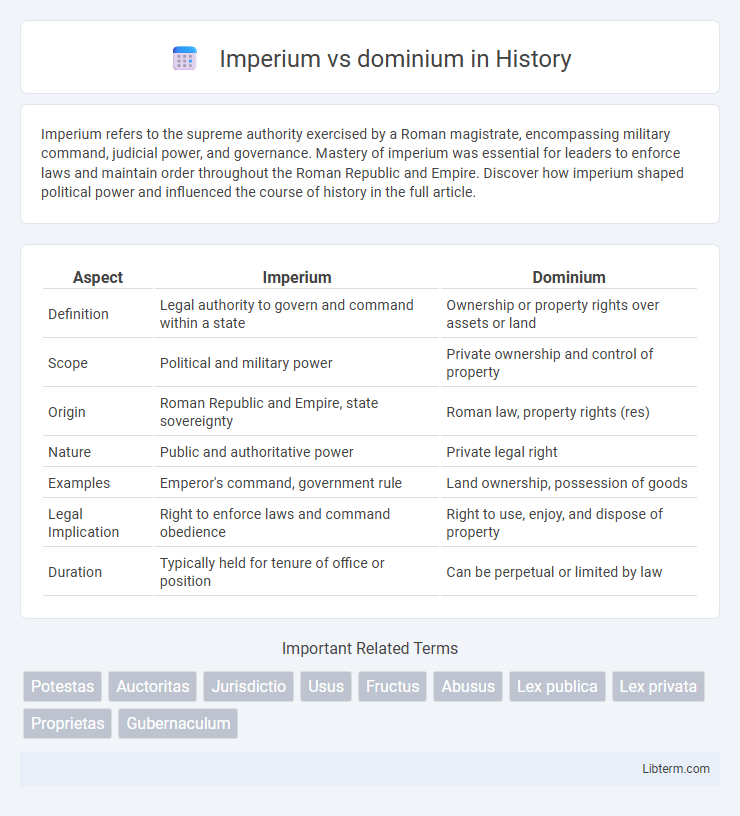Imperium refers to the supreme authority exercised by a Roman magistrate, encompassing military command, judicial power, and governance. Mastery of imperium was essential for leaders to enforce laws and maintain order throughout the Roman Republic and Empire. Discover how imperium shaped political power and influenced the course of history in the full article.
Table of Comparison
| Aspect | Imperium | Dominium |
|---|---|---|
| Definition | Legal authority to govern and command within a state | Ownership or property rights over assets or land |
| Scope | Political and military power | Private ownership and control of property |
| Origin | Roman Republic and Empire, state sovereignty | Roman law, property rights (res) |
| Nature | Public and authoritative power | Private legal right |
| Examples | Emperor's command, government rule | Land ownership, possession of goods |
| Legal Implication | Right to enforce laws and command obedience | Right to use, enjoy, and dispose of property |
| Duration | Typically held for tenure of office or position | Can be perpetual or limited by law |
Understanding Imperium: Definition and Origins
Imperium denotes the supreme executive authority in ancient Roman law, encompassing military command, judicial power, and administrative control held by magistrates or emperors. Originating from the Latin term meaning "command" or "power," imperium was central to maintaining order and enforcing the state's will across Rome's expanding territories. Unlike dominium, which refers to ownership rights over property, imperium signifies sovereign governance and the lawful exercise of state authority.
Defining Dominium: Historical and Legal Perspectives
Dominium, rooted in Roman law, represents the absolute ownership right over property, encompassing use, enjoyment, and disposal without interference. Historically, dominium distinguished private ownership from public authority, contrasting with imperium, which referred to state sovereignty and command power. Legal frameworks have evolved dominium into fundamental property rights recognized in civil law systems, emphasizing individual control and protection against unauthorized intrusion.
Key Differences Between Imperium and Dominium
Imperium refers to the sovereign power to command and enforce laws within a political or military structure, while dominium denotes ownership or property rights over assets or land. Imperium involves authority and jurisdiction exercised by a governing body, whereas dominium concerns legal possession and control of tangible or intangible property. The key difference lies in imperium's focus on authoritative governance versus dominium's emphasis on ownership rights.
The Role of Imperium in Governance and Authority
Imperium denotes the supreme executive power in Roman law, encompassing military command, judicial authority, and governance, positioning it as the foundation of sovereign rule. It confers the ability to issue binding orders, enforce laws, and maintain public order, thus serving as the core mechanism through which political authority is exercised. Unlike dominium, which pertains to private ownership rights over property, imperium embodies public, state-sanctioned power essential for the administration and control of society.
Dominium and Its Influence on Property Rights
Dominium represents the absolute ownership or control over property, emphasizing the right to use, enjoy, and dispose of assets without interference. Its influence on property rights establishes a foundation for legal systems to protect owners' interests, ensuring exclusive control and transferability of goods. This concept underpins modern property law by defining ownership boundaries and enabling economic transactions based on secure title.
Evolution of Imperium and Dominium in Roman Law
In Roman law, imperium evolved as the supreme executive authority held by magistrates and military commanders, granting the power to command troops, enforce laws, and govern provinces, while dominium referred to legal ownership and control over property. Over time, imperium expanded from limited magistrate powers to encompassing provincial governance and military command, reflecting Rome's increasing territorial complexity. Dominium developed through customary and statutory law to define property rights clearly, balancing individual ownership against state interests in land and resources.
Imperium vs Dominium: Applications in Modern Legal Systems
Imperium refers to the sovereign authority or power exercised by a state, while dominium denotes ownership rights over property. In modern legal systems, imperium manifests through governmental powers such as legislation, law enforcement, and regulation, whereas dominium underpins private property rights and ownership claims. Understanding the distinction between imperium and dominium is crucial for interpreting state sovereignty versus individual property rights in constitutional and property law contexts.
Philosophical Foundations of Imperium and Dominium
Imperium and dominium originate from Roman legal and political philosophy, where imperium refers to the sovereign power to command and enforce laws, while dominium denotes ownership rights over property. Philosophical foundations of imperium emphasize authority, governance, and the capacity to exercise control over a political community, rooted in concepts of legitimate power and sovereignty. Dominium, by contrast, is grounded in the natural law tradition, focusing on individual property rights and the relation between persons and things they lawfully possess or control.
Case Studies: Imperium and Dominium in Practice
Case studies of imperium and dominium illustrate the distinction between sovereign authority and property ownership. In Roman law, imperium granted magistrates the power to command armies and govern citizens, while dominium referred to individuals' ownership rights over land and goods. Modern examples include state sovereignty exercising imperium through government authority, contrasted with private dominium reflected in property ownership rights under civil law systems.
The Future Relevance of Imperium and Dominium Concepts
The future relevance of imperium and dominium concepts lies in their foundational roles within legal and political frameworks governing sovereignty and property rights. Imperium encapsulates state authority over public order and governance, increasingly pivotal as nations navigate global power dynamics and digital sovereignty. Dominium remains crucial for defining ownership rights amid evolving property laws and emerging challenges like virtual assets and resource allocation.
Imperium Infographic

 libterm.com
libterm.com